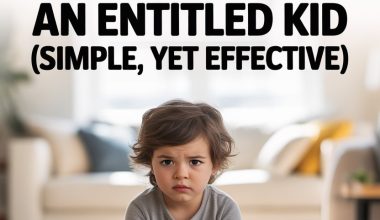When you’re juggling the job of parent, chef, referee, and part-time sock detective, the idea of “treating all your kids the same” sounds temptingly simple.
Like, wouldn’t it be nice if parenting was just a copy-paste situation?
But any parent who’s ever offered identical snacks to two children and ended up hosting a UN-level negotiation knows: equal doesn’t always mean fair.
Here’s why trying to dish out the same treatment can actually trip up some kids—and how you can give each of your brood what they really need. (Without needing a degree in international relations.)
Fair Is Not Always the Same
Picture a birthday party. Everyone gets a balloon—except your youngest insists on a green one, and your eldest will only accept blue. Cue the wailing.
Equal treatment hands out the same balloon to everyone, regardless of colour preference or ability to tie a knot. Fairness, on the other hand, means considering what each child actually needs to feel seen and supported.
Some children blossom with loads of independence. Others crave a bit more hand-holding.
It’s not about giving everyone the same, but everyone what helps them thrive. Sorting out fairness versus sameness can feel like untangling fairy lights, but it’s worth the effort.
The Research: One Size Doesn’t Fit All
Experts have a term for this: “differentiated parenting.” It’s not just a fancy phrase—they’ve found that tailoring your approach can help kids develop more secure attachments and stronger self-esteem.
A study published in the Journal of Family Psychology found that when parents adapt discipline and support to each child’s temperament, those kids tend to have better relationships with their parents source here.
That doesn’t mean picking favourites (nobody needs a “mum’s favourite” mug in the house). It’s about tuning in to what makes each child tick.
The Hidden Harm of “Equal”
When a child feels that their unique needs are being ignored in the name of fairness, resentment can creep in. Let’s say you have a sensitive, anxious child and a bold, adventurous one.
If you insist on sending both to the same sleepover, even though your anxious child isn’t ready, you’re not teaching resilience—you’re teaching them their feelings don’t matter.
The upshot can be low self-worth, sibling rivalry, or a child quietly trying to manage stress they’re not equipped for.
Some experts suggest that treating all children identically can actually feed sibling conflict, as each child fights harder to prove they’re “worthy” of the same treatment.
When Siblings Compare—And Complain
“Why does she get ice cream and I don’t?” If I had a dollar for every time I’ve heard that, I’d be writing this from a cabana in the Maldives. Sibling comparisons are inevitable.
Here’s a trick: be transparent about your reasoning (when age-appropriate). “Your sister got ice cream because she finished her broccoli. If you’d like some too, you know where the broccoli’s at.”
This helps children see the link between actions and outcomes—and that different choices have different consequences.
Sometimes, the best answer is a gentle, “Because you’re different people, and I love you both enough to notice that.” Prepare for the eye roll.
Tailoring Discipline Without Losing Your Mind
The word “fairness” can become a stick kids use to whack you with in the discipline department. A spirited child may need clear, firm boundaries and immediate consequences.
A more compliant child might just need a chat and a cuddle.
Start by noticing what works for each child. Maybe your eldest needs a warning before a consequence, while your youngest responds best to visual reminders (a sticker chart, perhaps).
If you’re worried this means extra work, take heart: fine-tuning your approach can prevent blow-ups down the track. Fewer tantrums at bedtime? That’s worth a few minutes of creativity.
Learning Styles, Not Labels
Some kids are “sit and listen” learners. Others can’t absorb anything unless they’re moving, fiddling, or singing the capitals of Europe.
Offering the same instructions in the same way may leave one of your kids staring into space, wondering if anyone else can hear the dog barking next door. Try using different approaches for different learners: picture cues, checklists, or silly rhymes.
This sends the message: “I see you. I get how you work.”
It’s not spoiling; it’s smart.
Celebrating What Makes Each Kid Shine
Parental pride should be like a buffet—plenty to go around, and not everyone needs to love the potato salad.
If your youngest brings home a certificate for “Best Dinosaur Roar,” while your eldest lands a spot on the football team, cheer for both achievements.
Avoid the temptation to measure success with the same old ruler. One child’s quiet kindness deserves just as much applause as another’s spelling bee win.
Notice the small stuff. “I saw you sharing your crisps with your friend today—very generous.” Over time, your kids will learn that what’s truly valued isn’t being the same, but being themselves.
What to Say When You’re Accused of Favouritism
Sooner or later, you’ll be accused—probably in a supermarket queue, for maximum embarrassment. “You always do more for him!”
Resist the urge to launch into a point-by-point defence with footnotes. Instead, acknowledge the feeling: “I can see you feel it’s unfair. Can we talk about what you need right now?”
Sometimes, the complaint is less about the second biscuit and more about wanting a bit of undivided attention.
Carve out one-on-one time, even ten minutes snuggled up with a book, and reassure them: “I love you just as much, even if I show it in different ways.”
When Equal Treatment Actually Works
Not every situation calls for bespoke parenting. Family rules around safety, respect, and basic expectations can (and should) be consistent for everyone.
No one’s getting away with riding the family dog like a horse, no matter how persuasive their puppy eyes.
Shared routines—like bedtime, screen-time rules, or family meals—help children feel secure. Tweaking the details for individual needs (earlier bedtime for the yawner, more reminders for the daydreamer) keeps things running smoothly.
Try This Tonight
If you fancy a gentle experiment, take a minute before the bedtime scramble.
Ask yourself: what did each of my children need most today? Was it reassurance, a challenge, a snuggle, a chance to be heard?
Try giving each child just a few minutes of individual attention, tailored to their mood.
You might be surprised at what comes up—the child who seemed fine all day suddenly bursts forth with questions, or the boisterous one asks for a quiet story.
Sometimes, the smallest tweak inspires the biggest connection.
Raising Kids, Not Clones
In the end, every child is a limited-edition original, not a copy off the assembly line. Treating them all “equally” risks ironing out the quirks and gifts that make your family such a brilliant, noisy, exhausting mix.
Fairness in parenting isn’t about giving each child the same, but giving each child what helps them grow.
With a bit of curiosity, some honest chats, and the willingness to try (and occasionally fail), you’ll get closer to what matters most: kids who feel truly seen.
And if they still complain about who had more chocolate buttons, well—welcome to parenthood.




